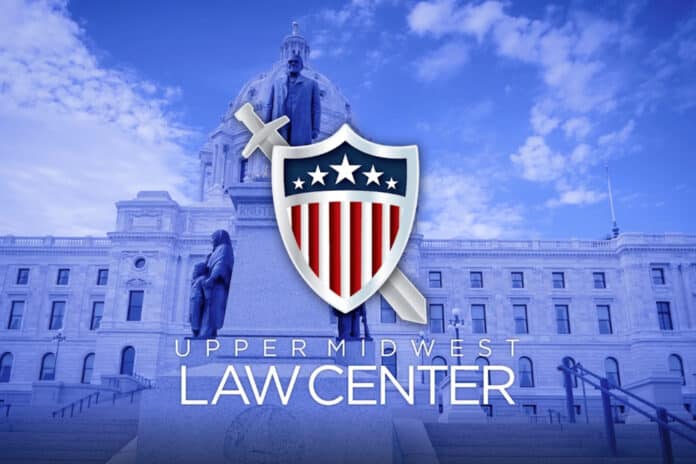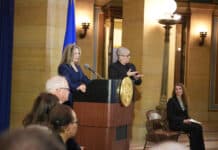This episode of the Minnesota Law Report comes to you direct from just outside the steps of the Minnesota Supreme Court. On Feb. 8, when the episode was recorded, I had just argued on behalf of the Upper Midwest Law Center and our clients in the landmark case Snell v. Walz, which challenges whether Gov. Tim Walz had the authority to issue a peacetime emergency related to COVID-19 in the first place. This commentary is an edited transcript of the audio and video versions you can find embedded here and on YouTube and Rumble.
The Feb. 8, 2024 argument in Snell v. Walz
Arguments in the Minnesota Supreme Court often take place in the Capitol and on the second floor, in the historical courtroom completed in 1905 with the rest of the Capitol. It is a beautiful courtroom with large murals and a skylight, and there’s a lot of history there. On Feb. 8, for the Snell argument, five justices out of the seven were available. Justice G. Barry Anderson was not able to be there, possibly due to illness, and new Justice Karl Procaccini did not take any part in the decision because he recused himself from this particular case. So the five justices who were there were Chief Justice Natalie Hudson, Justice Paul Thissen, Justice Anne McKeig, Justice Gordon Moore, and Justice Margaret Chutich.
The argument was lively. We think it went over well in terms of explaining what we’re asking for, which is for the governor to very simply show the people of Minnesota, when a pandemic-related emergency is declared, that all of the statutory requirements — all the things that the law requires — are in fact met. We argued that the governor should obtain an affidavit, a sworn statement, or similar evidence that demonstrates that the emergency does in fact endanger life, it endangers property, and that local government resources, whatever county it may be, are not adequate. Those are the law’s requirements.
In this case, we argued in the Supreme Court that the COVID-19 emergency did not endanger property by virtue of it being a virus, and that the governor did not show, with evidence, that local government resources around the state were inadequate to deal with COVID-19.
First, we argued that the governor did not show any evidence throughout the entirety of the existence of the pandemic that, in fact, the virus itself inherently endangers property. We think that makes it not subject to an emergency declaration. Future governors should have to show that a viral outbreak like COVID-19 does in fact endanger property. And if the legislature does not want to require that a viral outbreak endangers property, the legislature can take action to fix that. But the law says an act of nature must endanger property to justify an emergency.
Second, we argued that COVID-19 and all pandemics cannot be declared an emergency on a statewide basis just because the governor states, without any evidence, that “local government resources” are not adequate to deal with it. Not having adequate local government resources means that a city or a county doesn’t have police, fire, EMT, local government hospital beds, and so on, to deal with the problem.
In this case, the governor provided no evidence that local resources, in fact, were inadequate. He just said they were inadequate. And we cited, for example, in our Amended Petition filed way back in 2020 that in the fall of 2020, the Star Tribune and others reported that our local hospitals were prepared for not just the pandemic, but what they called the “twindemic” of COVID-19 and the flu. With that being the case, to justify an emergency, or to maintain an emergency declaration, the governor needs to identify what counties in Minnesota are experiencing a significant problem where the local government resources are not adequate to deal with it. Because if they are adequate to deal with it, then what’s the point of an emergency in the first place?
In response to our arguments, the governor and his team at the Attorney General’s Office really focused on the argument that this is way too much for the governor to have to do — to have to gather evidence to support his statements. The governor’s team said asking for the governor to provide evidence to support an emergency declaration would “hamstring” him and future governors from doing their job. We obviously disagree.
To be fair to the governor and to his team, the justices of the Minnesota Supreme Court did seem likely to side with the governor. That does not mean that’s necessarily going to happen — judges often have good “poker faces.” And sometimes, the justices of the Minnesota Supreme Court will make decisions that clarify the law in a helpful way that supports the rights of individual Minnesotans even while ruling in favor of the government. So in this instance, even if we don’t win the case in full, we will likely still get a decision from the Court that clarifies the law, that allows future legislatures to fix the law if it continues to be a problem, and gives the governor more guidance as to what’s required to comply with the Minnesota Emergency Management Act.
And so while we at the Upper Midwest Law Center bring cases that we think we’re going to win — because that’s what we’re in the business of doing — the fact is that even sometimes when we don’t win cases, we end up getting a decision from a court that clarifies for everybody in Minnesota exactly what the law is. That is a good thing for all Minnesotans.
And it’s because of support from people like you who donate to us and give us the wherewithal to do this that we’re able to take on cases that other law firms, private law firms, won’t take on because there is no pot of money at the end of the rainbow. We are proud to represent the appellants in this case, 16 different Minnesota small businesses, churches, and individuals. We’re grateful for their support and partnership as part of this case. Whether we win or lose the case, we are happy to have brought it. And we think that it’s going to be a landmark and important case for the people of Minnesota.
The arson at our Golden Valley offices
Leaving our argument today in the Minnesota Supreme Court and our challenge to the governor’s emergency powers aside, I’m also reporting on the other issue that has been in the news recently related to the Upper Midwest Law Center and our friends at Center of the American Experiment and TakeCharge. And that is the terrible criminal act of arson perpetrated against the UMLC’s third floor office at our building in Golden Valley, and also against the first floor offices of CAE and TakeCharge. You can see some of the footage from the charred remains of our office in the accompanying video.
Make no mistake: this is an ideologically motivated, hateful action against us just because we stand up for you, the regular Minnesotan, in court, and because we seek to uphold the law and the Constitution. That’s the bottom line.
But this will not deter our work. As you can see, I’m reporting to you from the midst of that work in the Minnesota Supreme Court, after I just made what I hope is a good argument to the Court.
We certainly do feel the target on our back, and you can’t help but feel a bit uncertain at times when you have that kind of target on your back. But it doesn’t matter to us. We know that that’s going to happen when you stand up for other people and put yourself out in public. At the end of the day, we’re going to keep doing our work and we will not be deterred by these criminals. We’re working closely with federal law enforcement to give them as much information as we’re able to in order to help them arrive at the capture and conviction of those who committed this terrible act of domestic terrorism.
With your support and help, we will continue to work remotely at this point. And we’re also looking for a new potential office space that will house us and will allow us to continue our good work and our in-person collaboration among myself, Doug Seaton, our president and founder, Allie Howell, who you’ve seen on this program, and our other employees and attorneys.
So we thank you for your support in this time. And we ask that you continue to support us. We can still receive mail if you decide you want to send us a check to our normal address, but we would recommend that at this point that you send us donations online at umlc.org/donate.
Thank you again for your support in this really difficult and trying time for us. We are going to continue to uphold your rights and liberties and fight for liberty and the rule of law, regardless of what others do, at the Upper Midwest Law Center.
That’s it for today and we’ll see you next week on the Minnesota Law Report.

















